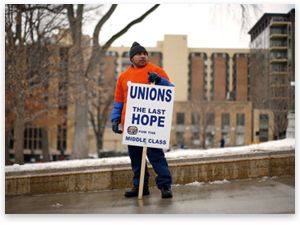The Battle of San Diego: Unions Go All Out for Status Quo — With Unlikely Ally
By Chris Reed
SAN DIEGO — On Tuesday, ground zero in the unions’ war on California taxpayers will be here, fought on three fronts.
In the mayor’s race, there’s a fascinating four-way campaign pitting county District Attorney Bonnie Dumanis, endorsed by incumbent mayor and fellow Republican Jerry Sanders; veteran Democratic U.S. Rep. Bob Filner; Republican-turned-independent Assemblyman Nathan Fletcher; and City Councilman Carl DeMaio, a libertarian Republican.
Dumanis lags, but polls are otherwise close, making a November runoff certain, and organized labor has gone all out to try to keep DeMaio from advancing. Driving the animus: The 37-year-old Georgetown graduate has been a powerful advocate for basic changes in how government works, pressing for outsourcing, an end to generous defined-benefit pensions and a renunciation of the pay practice under which workers get automatic “step” raises many years just for showing up on the job.
This assault on the San Diego City Hall status quo has produced a vicious response from individual union members and union organizations. DeMaio and his supporters were taunted and harassed while gathering signatures for a sweeping benefits reform measure that’s on Tuesday’s ballot as Proposition B. The first-term councilman, who is gay, has also been baited for his sexual orientation and subjected to an ugly whispering campaign. Last week, the city police union began airing a grossly misleading attack ad that implied DeMaio didn’t think the families of dead cops should get survivor benefits.
Union partner
But the perverse twist is which mayoral candidate has been the unions’ main partner in assaulting DeMaio in defense of the status quo. It’s not Filner, the abrasive, in-your-face traditional 1960s liberal. It’s Fletcher, a photogenic 35-year-old Marine war hero who until two months ago was a conservative Republican with some maverick trappings.
After DeMaio shocked many observers by capturing the local GOP’s formal endorsement over the more experienced Dumanis and more conventional Fletcher, Fletcher dropped his party affiliation and insisted it wasn’t driven by expedience but by his conscience. To the cheers of New York Times columnist David Brooks, Fletcher declared he could no longer in good faith be a member of a party that was part of a dysfunctional political dynamic dominated by “extremists.”
Ever since, Fletcher has offered up DeMaio as an example of the “extremists” who are polluting California’s body politic — even as Fletcher has supported Proposition B, the sweeping benefits reform measure largely authored by DeMaio that can fairly be described as radical. It would shift all new city hires but police to 401(k)-type retirement benefits and seek to impose a five-year cap on the “pensionable pay” of all employees. This dual, dueling Fletcher stand doesn’t add up. Call it Fletcher Logic.
Meanwhile, he’s kept his opinions to himself about the extremism on display in the union-led campaigns against Proposition A, which would ban the city’s use of project labor agreements unless doing so would lead to the loss of state or federal funds, and against Proposition B.
Union clout
To undercut Proposition A, unions got the Legislature and Gov. Jerry Brown to enact a law that takes state construction funds away from charter cities with PLA bans. That’s extraordinary enough, but it doesn’t compare to Sacramento’s reaction to Proposition B.
The state Public Employment Relations Board, controlled by union allies, sought unsuccessfully to keep the measure off the ballot and has made clear its intention to scuttle the measure should it pass. Why? On the grounds that since some elected officials helped draft Proposition B, it amounted to a violation of collective-bargaining rights. By this bizarre standard, just about any attempt by the public to use the ballot process to directly control public employees’ pay and compensation can be deemed as a violation of employee rights.
For those on the outside looking in, this union bullying and intimidation may seem so grotesque and over the top that it verges on the comic. But for those who live anywhere else in California, don’t feel inclined to cackle. Today the target is unlucky San Diego, but soon it will be your community.
That’s because the battle to preserve public employees’ jobs, pay and benefits is the defining fight of early 21st-century state politics. As far as the unions are concerned, it should be against the law to even consider reductions. Because, after all, the state’s primary role is not as a provider of public services. It is as a provider of well-paying government jobs with great benefits. That’s the California way.
Or so the unions believe. On Tuesday, we’ll find out if San Diegans agree.
Reed is an editorial writer for the U-T San Diego newspaper, formerly the Union-Tribune, and runs the Calwhine.com politics website.
Related Articles
Voters douse most tax-increase fires
June 15, 2012 By Dave Roberts When you take on the firefighters’ union, it helps to have an asbestos hide.
Fiorina celebrated government loans
… and was, apparently, a big fan of Small Business Administration affirmative action. Check out this speech from 2003. It’s funny
New flare-ups in progressives’ summer of discontent
The California progressive movement’s summer of discontent continues, with anger still on display over the abrupt withdrawal of a single-payer




